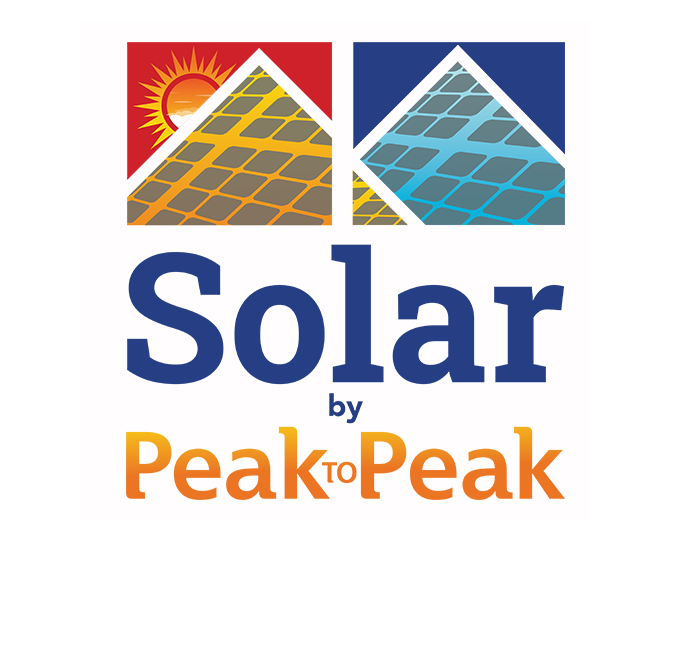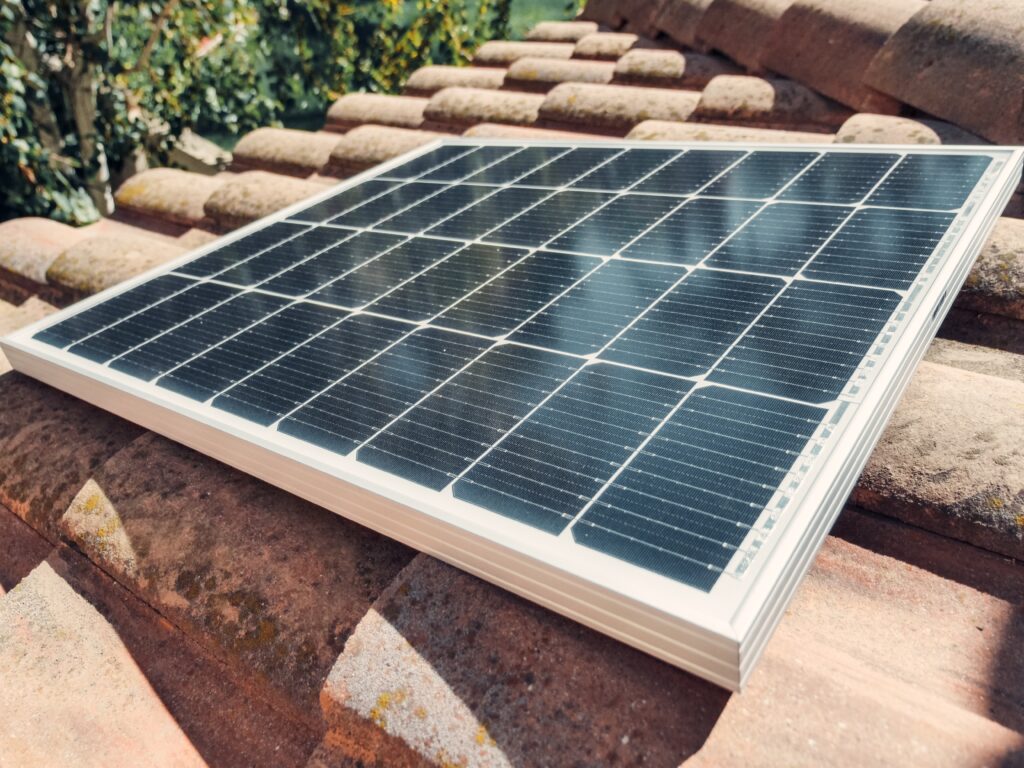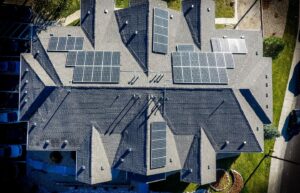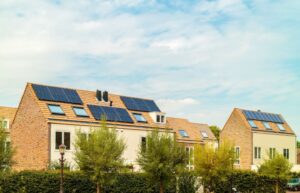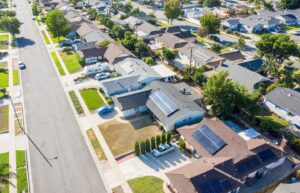Did you know that solar panels have come a long way in terms of efficiency? The efficiency of these monocrystalline silicon solar panels refers to how well they convert sunlight into electricity, measured in watts.
Simply put, the higher the efficiency, the more electricity is generated from the same amount of sunlight. Understanding the efficiency of these efficient solar panels is crucial for maximizing energy production and cost savings. Over the years, advancements in solar cell technology have led to significant improvements in overall panel efficiency.
There are different types of solar panels with varying levels of efficiency, including those that utilize PV cell technology. Factors such as thermodynamic efficiency, conversion efficiency, and power loss play a role in determining a panel’s total efficiency.
With solar power gaining popularity in places like Littleton, CO, and beyond, it’s important to grasp the concept of solar panel efficiency. By harnessing this renewable energy source effectively with PV cell technology, we can reduce our reliance on traditional power sources and contribute to a greener future. Monocrystalline panels are an efficient type of solar panel that can help us achieve this goal.
So, how efficient are the best solar panels? Let’s delve deeper into their capabilities and explore why investing in high-efficiency PV cells can be a game-changer for your energy needs.
Assessing the Efficiency of Solar Panels
Solar panels, particularly those using solar power and monocrystalline PV cell technology, have gained significant popularity as a renewable energy source.
However, it is important to assess the efficiency of these solar panels in order to determine their performance and whether they are a worthwhile investment. When evaluating the efficiency of solar panels, there are a few key factors to consider, such as wattage and overall performance.
Power Output Under Standard Test Conditions (STC)
One way to assess the efficiency of solar panels is by measuring their power output under standard test conditions (STC). STC refers to specific conditions that include an irradiance level of 1000 watts per square meter, a module temperature of 25 degrees Celsius, and an air mass spectrum of 1.5.
By conducting tests under these standardized conditions, manufacturers can provide accurate information about the maximum power output their panels can achieve, leading to significant energy savings.
Impact of Temperature Coefficient, Shading, and Installation Angle
While STC measurements provide valuable insights into the efficiency of solar cell technology, it’s important to consider other factors that affect overall performance. The temperature coefficient of solar cells refers to how much their power output decreases with rising temperatures.
Shading caused by nearby objects or vegetation can significantly reduce the efficiency of solar cells by blocking sunlight. The installation angle plays a role in maximizing energy production since different angles receive varying amounts of solar irradiance throughout the day.
To optimize efficiency despite variables such as irradiance, it is crucial to carefully plan the placement and orientation of solar PV cells. Avoiding shading and selecting an optimal installation angle for monocrystalline solar panels can help maximize energy generation potential.
Regular Monitoring and Data Analysis
Monitoring solar panel performance over time is essential for assessing their actual efficiency in real-world conditions and achieving energy savings. Regular data analysis allows homeowners or businesses to track fluctuations in power output and identify any issues affecting the system’s PV cell performance.
By comparing actual results with expected values based on STC ratings, individuals can determine if their panels are operating at peak efficiency or if further investigation is required. This review process helps ensure optimal wattage production and overall system effectiveness.
Professional Assessment by Experts
For accurate insights into solar panel efficiency, it is advisable to seek a professional assessment from experts in the field of PV cells.
These professionals can conduct detailed evaluations of a solar panel system’s performance, taking into account factors such as irradiance levels, reflectance, thermal cycling coefficient, and installation angle. Their expertise and specialized equipment enable them to provide comprehensive reviews of the wattage and cost efficiency of installed solar panels.
Understanding Solar Panel Efficiency Ratings
Solar panel efficiency ratings are important to consider when reviewing monocrystalline panels. The higher the efficiency rating, the more electricity can be generated from the same amount of sunlight, increasing overall power output. This can offset the cost of higher-average-efficiency panels by maximizing energy production.
Efficiency ratings for monocrystalline solar panels in the industry typically range between 15% and 22%. These average ratings vary based on the different technologies used in manufacturing solar panels, which impact the cost and performance capabilities.
One important consideration when choosing high-efficiency solar panels is balancing upfront costs with long-term benefits. While high-efficiency solar panels, such as those made with advanced solar cell technology like Jinko Solar cells, may initially come with a higher price tag, they often result in greater energy savings over time due to their increased ability to convert sunlight into electricity efficiently.
In Littleton, CO, where abundant sunshine is available throughout the year, investing in monocrystalline solar panels with lower efficiency ratings can make a significant difference in overall energy generation and cost savings.
By selecting highly efficient monocrystalline solar cells, homeowners in Littleton can harness more power from the sun’s rays and potentially reduce their reliance on traditional grid-supplied electricity for years.
Here are some key points regarding solar panel efficiency ratings. Size panels and monocrystalline panels are important factors to consider.
- Different Efficiency Ratings: Solar panel manufacturers produce various models with different efficiency ratings. It’s essential to compare these ratings before making a purchase decision.
- Power Rating: Higher-efficiency panels generally have a higher power rating, meaning they can produce more electricity per square meter of surface area.
- Long-Term Savings: Although high-efficiency panels might have higher upfront costs, they often lead to greater long-term savings by generating more electricity over their lifespan.
- Technological Advances: Ongoing advancements in solar technology continue to improve panel efficiencies, allowing for even greater conversion rates in newer models.
- Environmental Impact: High-efficiency solar panels can contribute to reducing carbon emissions by generating more electricity from renewable sources.
- Return on Investment: Investing in high-efficiency panels can potentially result in a faster return on investment due to increased energy production and savings on utility bills.
Understanding the average cost of solar panels and their temperature efficiency ratings is crucial for homeowners in Littleton, CO. By selecting panels with higher efficiency ratings, residents can maximize their energy generation potential and enjoy the benefits of clean, sustainable electricity.
Maintenance and Upkeep of Solar Panels
Regular cleaning and maintenance are essential for ensuring optimal performance and maximum energy production from solar panels. Homeowners can identify potential issues that may affect panel efficiency by keeping solar panels clean and free from dirt, debris, or shading.
Additionally, it is important to note that regular maintenance is crucial for maintaining the warranty on the panels. The temperature at which the panels operate can also impact their efficiency. Therefore, it is important to monitor the temperature of the cells to ensure they are within the recommended range.
Conduct Regular Inspections
Regularly inspecting the panel area is crucial for maintaining the efficiency of solar panels. Any accumulation of dust, leaves, or other debris can reduce sunlight reaching the cells and hinder their ability to generate electricity.
Homeowners in Littleton, CO, or any other location with a high level of airborne particles should be particularly vigilant about cleaning their solar panels to ensure optimal performance throughout the years. It’s also important to note that solar panels typically have an average warranty period.
Thoroughly Clean Your Solar Panels
To ensure thorough cleaning of high-efficiency panels, it is recommended to follow the manufacturer’s guidelines for maintenance. Different solar panel manufacturers may have specific instructions on how to clean their products effectively without causing damage, which can lead to increased overall efficiency.
Following these guidelines will help maintain warranty coverage and prevent any accidental damage during cleaning. While homeowners can perform routine cleaning themselves, periodic inspection by professionals is also beneficial for ensuring the warranty and high efficiency of the solar installation.
Solar installation companies in Littleton or other areas often offer maintenance services to ensure that all components are functioning correctly and to detect any damage or malfunctioning parts that may hinder the system’s increased efficiency and panel power.
Follow Upkeep Practices
In addition to regular cleaning and inspections, it is crucial to adhere to the proper upkeep practices outlined by solar panel manufacturers. This includes following any recommended warranty and maintenance schedules for checking connections, monitoring electrical output, and inspecting inverters or batteries, if applicable.
By doing so, homeowners can catch potential issues early before they escalate into significant problems. This is especially important for those using high-efficiency panels, as their increased efficiency requires diligent maintenance.
Investing in high-quality solar panels from reputable manufacturers is another way to ensure long-term efficiency. These manufacturers often provide comprehensive product warranty coverage, giving homeowners peace of mind regarding potential defects or performance issues.
Solar systems benefit from regular attention to maximize the lifespan and efficiency of their solar panels. Homeowners should dedicate time and effort to maintenance tasks like cleaning and inspections. This will ensure that the warranty on the panels lasts for many years and that the cells remain in good condition.
Factors Affecting Solar Panel Performance
Sunlight intensity, duration, and angle significantly impact solar panels’ performance and overall energy output. The amount of sunlight that reaches the cells directly affects their efficiency in converting sunlight into electricity.
Regions with high solar irradiance, such as Littleton, CO, are more suitable for solar panel installations due to the abundance of sunlight. These factors have played a crucial role in determining solar panels’ rating and maximum energy production over the years.
Shading
Solar panel efficiency suffers significantly when there is shading from trees, buildings, or other obstructions. Even a small amount of shading can significantly impact the performance of solar panels and their cells.
It is essential to ensure that panels are installed in an area where they receive maximum exposure to sunlight throughout the day for optimal rating. Additionally, it’s important to consider the warranty period, which is typically several years.
Temperature
Temperature variations affect the performance of solar cells; excessive heat can temporarily decrease conversion rates. High temperatures can cause a decrease in efficiency due to an increase in the temperature coefficient of solar energy.
Manufacturers often provide temperature coefficients for their solar panels, indicating how much the panels’ power output will decrease with rising ambient air temperatures or cell temperatures.
Orientation
Solar panel orientation towards true south and a proper tilt angle optimize energy production by maximizing efficiency. The orientation and tilt angle of solar panels play a crucial role in maximizing energy production and achieving a high efficiency rating.
Panels should be positioned facing true south (in the Northern Hemisphere) to capture the most sunlight throughout the day, ensuring optimal conversion efficiency. Adjusting the tilt angle according to local conditions helps optimize energy generation by ensuring that cells receive optimal sun exposure for maximum efficiency.
Environmental Factors
Weather conditions can impact the performance of solar panels, affecting their efficiency and output. Extreme events like storms or heavy snowfall may temporarily damage or reduce the efficiency of solar panels.
Additionally, dust accumulation on panel surfaces can hinder light absorption and decrease overall output. Considering these factors when evaluating the warranty and rating of solar panels is important, as they can affect their performance over the years.
Surface Area
The surface area of solar panels is an important factor in determining their efficiency rating. Larger surface areas allow for more light absorption and a higher energy production capacity. However, it is crucial to consider available space constraints when deciding on the size and number of panels for installation.
This will ensure optimal performance and maximize energy production over the years. Additionally, the type of cells used in the panels also plays a significant role in their overall performance.
Manufacture Defects
Manufacturer defects can also impact the warranty of solar panel cells. While rare, defects in manufacturing processes can lead to decreased efficiency or even the complete failure of panels. It is crucial to choose reputable manufacturers with high ratings and ensure proper quality control measures are in place.
Standard test conditions (STC) provide a benchmark for comparing solar panel performance, including their efficiency rating. STC specifies a set of conditions, including sunlight intensity, temperature, and other factors, under which high-efficiency panels are tested to determine their power output.
Comparing the performance of different panels based on STC data can help make informed decisions when selecting the most efficient ones with a reliable warranty.
Comparing Top-Rated Solar Panels for Efficiency
Researching and comparing the efficiency ratings of different solar panel brands helps identify the most efficient options. Efficiency is a crucial factor to consider when evaluating the warranty and lifespan of the panels.
By understanding the efficiency ratings of various brands and the number of years they are covered under warranty, homeowners can make informed decisions that maximize energy production and savings. Additionally, it’s important to consider the quality of the cells used in the panels.
One important aspect to consider alongside efficiency is the warranty, durability, and customer reviews of the solar cells. While high efficiency is desirable, it’s equally important to ensure that the solar panels are built to last and come with a reliable warranty.
This provides peace of mind and protects your investment in the long run. Reading customer reviews can give insights into real-world experiences with different brands and their performance over the years.
Fortunately, there are online resources available that provide comprehensive comparisons of top-rated solar panels based on their efficiency and warranty.
These platforms offer detailed information about each brand’s average efficiency rating, quality, percentage of monocrystalline PC or other types of cells used, price range, and customer satisfaction levels over the years.
They also provide an overall Ecowatch rating that takes into account multiple factors beyond just efficiency.
In addition to online resources, consulting with solar experts can offer valuable insights into the best-performing and most efficient panels. Experts have extensive knowledge about industry averages for efficiency as well as specific recommendations based on your location and energy needs.
Solar specializes in providing personalized advice tailored to individual requirements. Their expertise ensures that you make informed decisions about which cells to choose, ensuring optimal performance for many years.
To understand how efficient solar cells are, it’s essential to consider their average efficiency rating compared to industry standards. The industry average for residential solar panels typically ranges from 15% to 20% over the years. However, some top-rated panels boast efficiencies above 22%, pushing the boundaries for maximum energy generation.
When comparing different brands’ efficiencies and warranties side by side, one may come across terms like “monocrystalline perc” or “topcon cells.” Monocrystalline perc (passivated emitter rear contact) panels are known for their high efficiency and sleek appearance.
They use advanced technology to capture sunlight efficiently, making them a preferred choice for those seeking maximum energy output and long-lasting performance. On the other hand, topcon cells utilize innovative manufacturing processes to achieve higher efficiencies and have a higher rating compared to traditional solar panels.
While considering the efficiency of solar panels, it’s important to take into account the average cost and warranty of these high-efficiency panels. These panels often come at a premium price due to the advanced cell technologies involved in their production.
However, weighing the upfront investment against long-term savings on electricity bills and potential incentives or tax credits available for installing efficient solar systems is crucial to making an informed decision.
Quicker Payback Period: Understanding the Return on Investment for Efficient Solar Panels
High-efficiency solar panels offer homeowners a quicker payback period by generating more electricity. This means that not only are they environmentally friendly, but they can also save you money in the long run. The warranty on these high-efficiency solar panels is typically around 25 years, providing peace of mind and long-term reliability.
Various factors, including upfront costs, electricity rates, and available incentives, influence the return on investment (ROI) of installing efficient solar panels. With their advanced technology and optimized cells, these panels are a smart choice for homeowners looking to harness the power of the sun.
One of the key advantages of high-efficiency solar panels is their ability to generate more electricity using cells compared to traditional panels.
This increased power output allows homeowners to offset a larger portion of their electricity bills and use the warranty. By harnessing more energy from the sun, these efficient panels help reduce dependency on grid-supplied electricity, leading to greater long-term savings.
Calculating the ROI of efficient solar panels involves analyzing your energy consumption patterns and understanding how much you can save over time. For example, if you live in Littleton, CO, where sunlight is abundant throughout the year, investing in high-efficiency solar panels with advanced cells would make even more financial sense due to the higher potential for energy generation.
Additionally, it’s important to consider the warranty provided with the panels to ensure long-term benefits.
Let’s break down some key factors that influence the payback period and ROI, including total panel efficiency, efficiency rating, efficient panel, and various panel models.
- Upfront Costs: Efficient solar panels may have a higher initial cost compared to standard ones. However, it’s important to consider their long-term benefits. While you may spend more initially, these high-quality panels often come with longer warranties and better durability, ensuring they last for decades with minimal maintenance.
- Electricity Rates: The cost of grid-supplied electricity plays a significant role in determining your payback period. Higher electricity rates mean that generating your own clean energy becomes even more financially advantageous. By reducing or eliminating your reliance on grid power through efficient solar panel installations, you can protect yourself against rising utility costs.
- Available Incentives: Many governments and local authorities offer incentives and rebates for installing renewable energy systems like solar panels. These incentives can significantly reduce the upfront costs, making the payback period even shorter. Research and take advantage of any available programs in your area to maximize your ROI.
State-Specific Solar Incentives for Homeowners
Many states nationwide recognize the importance of renewable energy and have implemented specific incentives, such as tax credits or rebates, to encourage homeowners to install solar panels.
These incentives can play a crucial role in making high-efficiency solar systems more financially viable for residential installations. Understanding and taking advantage of these state-specific programs is essential for homeowners looking to maximize the benefits of their solar investments, including warranty and cell.
Do Research on State-Specific Programs
Researching state-specific programs is the first step toward unlocking potential incentives that can significantly reduce upfront costs. Each state has its own set of regulations and offerings, so it’s important to delve into the details of what your state provides.
For example, if you reside in Arvada, CO, you’ll want to explore the specific solar incentives available in Arvada, including the efficiency rating of solar panel models and the potential cost savings from using efficient panels with high-quality cells..
Consult with Solar Panel Installers
Consulting with local solar installers or government agencies is an excellent way to gather accurate information about applicable incentives and increase your efficiency rating.
These professionals are well-versed in the latest policies and can guide homeowners through the process, providing insights into how certain programs like tax credits work and helping calculate potential savings numbers based on your specific circumstances.
One type of high-efficiency solar panel gaining popularity is HJT (Heterojunction Technology). This technology combines traditional crystalline silicon cells with ultra-thin amorphous silicon layers, resulting in improved performance even under low-light conditions. By utilizing HJT panels, homeowners can maximize their energy production throughout the year.
The financial benefits of installing high-efficiency solar panels, coupled with state-specific incentives, are substantial for cell owners. Not only do these systems generate significant savings on cell electricity bills over time, but they also contribute positively to our environment by reducing cell carbon emissions.
At the end of each year, homeowners with efficient solar panels may find themselves with surplus energy that they don’t consume. In such circumstances, some states offer net metering programs that allow residential installations to feed excess electricity back into the grid in exchange for credits.
These credits can then be used during times when the solar panels have a low-efficiency rating, such as during cloudy days or at night.
Maximizing Efficiency in Small Projects with Compact Solutions
Maximizing efficiency in solar panel installation is crucial. Limited space or irregular rooftop shapes can pose challenges for traditional solar panel options. However, there are compact solutions available from solar panel manufacturers that can optimize energy production and overcome these obstacles.
Compact Solutions Enhancing Performance
One efficient type of solution for small-scale installations is the use of micro-inverters or power optimizers to improve solar cell efficiency. These compact devices work by mitigating shading issues and improving individual panel output.
By allowing independent operation per panel, micro-inverters maximize energy production even when some panels are shaded or experiencing suboptimal conditions. This can greatly enhance the efficiency rating of solar installations.
For example, in areas like Littleton, CO, where nearby structures or trees may partially block sunlight, micro-inverters are invaluable for optimizing each solar cell’s performance. Despite shading concerns, they ensure that each panel operates at its peak performance level.
This increased efficiency translates into higher overall energy production for the system.
Ideal for Limited Spaces and Irregular Rooftop Shapes
Efficient, compact solutions are particularly well-suited for rooftops with limited space or irregular shapes that cannot accommodate traditional setups. Unlike string inverters commonly used in larger installations, micro-inverters, or power optimizers, allow flexibility in design and placement, improving the efficiency rating.
In situations where space is a constraint, such as on crowded urban rooftops, these compact cell solutions offer a practical alternative. Their smaller size allows for easy installation even in tight spaces without compromising efficiency ratings.
Real-World Benefits and Partnerships
The cell industry standard has recognized the benefits of using compact cell solutions to maximize efficiency in small-cell projects. Numerous cell product lines now include options specifically designed to work seamlessly with micro-inverters or power optimizers.
For instance, leading solar panel manufacturers like Alpha Pure and REC have developed specific partnerships with micro-inverter manufacturers to provide customers with integrated cell solutions. These collaborations ensure that the panels and compact devices work harmoniously together, optimizing performance and overall efficiency.
Experience the Difference
In the real world, the use of micro-inverters or power optimizers has shown tangible benefits in terms of efficiency rating and cell. Installations utilizing these compact solutions consistently demonstrate increased energy production compared to traditional setups.
Journalism often highlights success stories where homeowners have experienced significant improvements in their solar cell system’s output after incorporating micro-inverters or power optimizers. Such firsthand experiences reinforce the effectiveness of these technologies in maximizing efficiency for small-scale cell projects.
Smaller and More Compact: Efficient Solutions for Limited Space
Solar panels designed specifically for limited spaces, such as urban areas or small rooftops, offer high efficiency with a smaller footprint. These compact panels, also known as cell panels, are ideal for installations with space constraints. Despite their smaller size, these cell panels can still provide significant energy production while maintaining high-efficiency ratings.
Choosing compact solutions ensures maximum utilization of available space without compromising on performance. In Littleton, CO, where space is often at a premium due to the city’s rapid growth and limited roof space, companies have turned to innovative technology and cell design to create smaller solar panel products that deliver impressive power output.
Advanced Cell Technology
One of the key factors contributing to the efficiency of these compact panels is their advanced cell technology. Manufacturers have developed new cell technologies that allow for higher power generation within a reduced area. By incorporating multi-cell designs and optimizing the use of each square meter, these panels can generate more electricity per unit of surface area.
For instance, Company X has introduced a series of compact solar panels that utilize cutting-edge cell technology to maximize power production in limited spaces. Their unique cell design enables each square meter of the panel to capture sunlight more effectively, resulting in greater energy conversion rates.
Easier Installation
In addition to their efficient cell technology, these compact solar panels also offer other advantages for those seeking solutions for limited space. The smaller size allows for easier installation on rooftops with restricted area availability. Furthermore, they can be seamlessly integrated into existing structures without compromising architectural aesthetics.
In Colorado, where rooftop real estate is scarce but demand for sustainable energy is high, selecting solar panels designed explicitly for limited cell spaces becomes crucial. These compact solutions help meet renewable energy goals and optimize the efficient use of available resources.
Choosing the Most Efficient Solar Panels for Your Needs
Assessing individual energy requirements and budgets is crucial when considering solar panel options for your cell. By taking these factors into account, you can determine which solar panel option best suits your needs.
Amount of Available Roof Space
One of the first things to consider is the amount of available roof space. Different solar panel models have varying sizes, so it’s important to choose one that fits comfortably on your roof while maximizing energy production. The local climate conditions play a significant role in determining the efficiency of solar panels.
Compare Efficiency Ratings
Comparing efficiency ratings is another essential step in choosing efficient solar panels. The efficiency rating indicates how well a panel converts sunlight into usable electricity. Monocrystalline silicon-based panels generally have higher efficiency ratings compared to polycrystalline panels.
Warranty
Warranties also play a significant role in determining the reliability and performance of solar panels. Reputable manufacturers often provide extended warranties on their products, giving buyers peace of mind regarding their investment. It’s advisable to select panels with longer warranties, as they demonstrate confidence in their product’s durability and performance over time.
Reviews
Customer reviews can be invaluable when making decisions about solar panel options. Reading reviews from other homeowners who have installed similar systems can provide insights into real-world experiences with different brands and models. Look for positive feedback regarding energy savings and overall satisfaction with the chosen panels.
Consultations
Consulting with reputable solar installers or experts can provide personalized recommendations based on your specific needs.
They can assess your energy requirements, budget constraints, and other factors unique to your situation before recommending suitable panel models and manufacturers. Their expertise can help you make an informed decision, ensuring that you choose the most efficient solar panels for your home.
The Bottom Line: How Efficient Are the Best Solar Panels?
Being aware of the factors that affect solar panel performance, such as shading, temperature, and orientation, allows you to make the necessary adjustments for better results.
When choosing the most efficient solar panels for your needs, prioritize those with higher conversion rates and proven track records of reliability. Consider factors like brand reputation, certifications from trusted organizations like Energy Star or NREL (National Renewable Energy Laboratory), and real-world performance data.
In conclusion, Investing in highly efficient solar panels offers numerous benefits, including reduced energy costs, quicker payback periods, and environmental sustainability. By understanding the factors that affect efficiency and considering state-specific incentives, you can make a well-informed decision that aligns with your goals.
